The UC Merced Library's location strategically places it as a prime location to collect materials related to the Sierra Nevada. We collect materials that trace the history, and impact, of human settlement on the region, as well as materials that document the use of, and policies impacting, the land and natural resources of the region. We also collect materials that trace the literary, cultural, and artistic history of the region, in particular those creators, and those creative works, that speak to the region's social, political, and environmental concerns, such as indigeneity, conservation, and the region's representation in the creative arts.
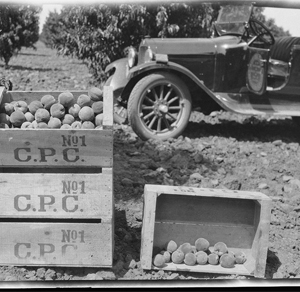
In 2016, under an agreement with the UC Division of Agriculture and Natural Resources (UCANR), the University of California, Merced Library began a project to archive, preserve, and provide access to UCCE historic records. Working with county offices, we have uncovered hundreds of linear feet of materials on crop research, agricultural production, technology, land use, socioeconomic development, 4-H and youth development, among other subjects. These materials offer a firsthand look at the changes in California communities over the past century, and at a face of California that has global impacts.
In addition to preserving and providing access to the records of county offices, we are working to surface and improve online access to publications and other information sources about California agriculture. The search tool we are developing on this site will include UCANR publications in Internet Archive, HathiTrust, as well as archival materials we have digitized.
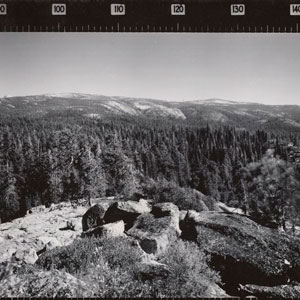
The Library worked with the Yosemite National Park Library, and the Yosemite National Park Archives to digitize and provide access to a series of panoramic photographs of Yosemite National Park. UC Merced researchers have used the resulting images in their work.
View results of our collaborations on Calisphere
Read a feature on our collaborations with Yosemite National Park and UC Merced researchers
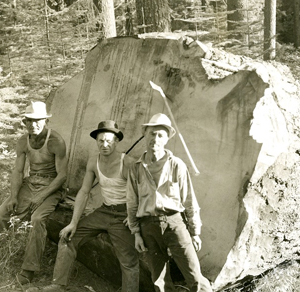
The Yosemite Lumber Company, founded in 1911 by Bay Area investors F.M. Fenwick, James Tyson, and Charles Nelson, was created after Mr. Prather and Mr. Lehmer of the Yosemite Valley Railroad sought partners in freighting lumber along the new line between Mariposa and El Portal. The Yosemite Valley Railroad, completed in 1906, necessitated industrial and commercial use to generate profit and justify the existence of the line. In 1911, at the historic ford of Merced Falls, the most advanced lumber mill of its kind in the area began harvesting 10,000 acres of sugar pine trees in Yosemite Valley along the Merced River. Around the mill sprung a dynamic town—barracks, theaters, hotels, restaurants—bustling with a diverse array of workers and visitors. The YLC bought more land along the railroad route and expanded operations but various conservationist campaigns, legal troubles, a lagging lumber market after World War I, and destructive fires spelled the end of the Yosemite Lumber Company in 1927 and the closing of the mill. The mill was reopened in 1929 under the Sugar Pine Lumber Company until 1931, when the Great Depression strained its profitability, and again in 1935 as the Yosemite Sugar Pine Lumber Company. The YSPLC operated with the original sugar pine stands, though reduced due to the expansion of conservation of Yosemite National Park. Once the stands were depleted and the more efficient all-weather highway was built, the lumber mill closed for the last time in 1942 and all assets were sold. The closure also led to the abandonment of the Yosemite Valley Railroad line and the town of Merced Falls was quickly abandoned in its wake.
View the Yosemite Lumber Company, Merced Falls Photographs online at Calisphere.
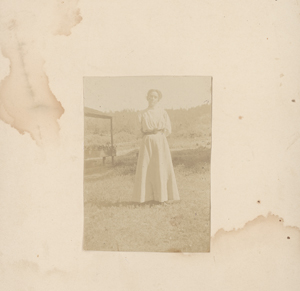
In 1849, Hosea Dudley, ancestor of Walter Doyle McLean, sailed around Cape Hope in his journey from Boston to San Francisco. He later settled in the Coulterville area near what is now Yosemite National Park. Dudley Ranch became a stagecoach stop for travelers visiting the Yosemite Valley and surrounding region. The family collection includes a register of guests with the signatures of John Muir and Thomas Edison; journals; Miwok Indian baskets; mining nuggets; and other Gold Rush era artifacts.
View this collection online at Calisphere.
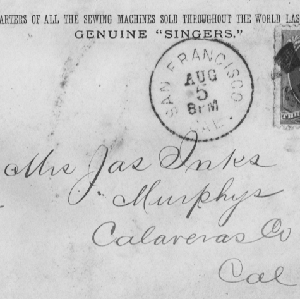
In 2010, UC Merced undergraduate student Kyle Shipley undertook a project to digitize and curate a small collection of items from the Angels Camp Museum for his "History 190: Applied Research" internship under Professor Gregg Herken.
This collection contains multiple personal correspondences and other materials for the Inks family of Calaveras County between the years 1869 and 1889. Letters contain personal sentiment and hopes for the family, most notably James Inks and his close family.